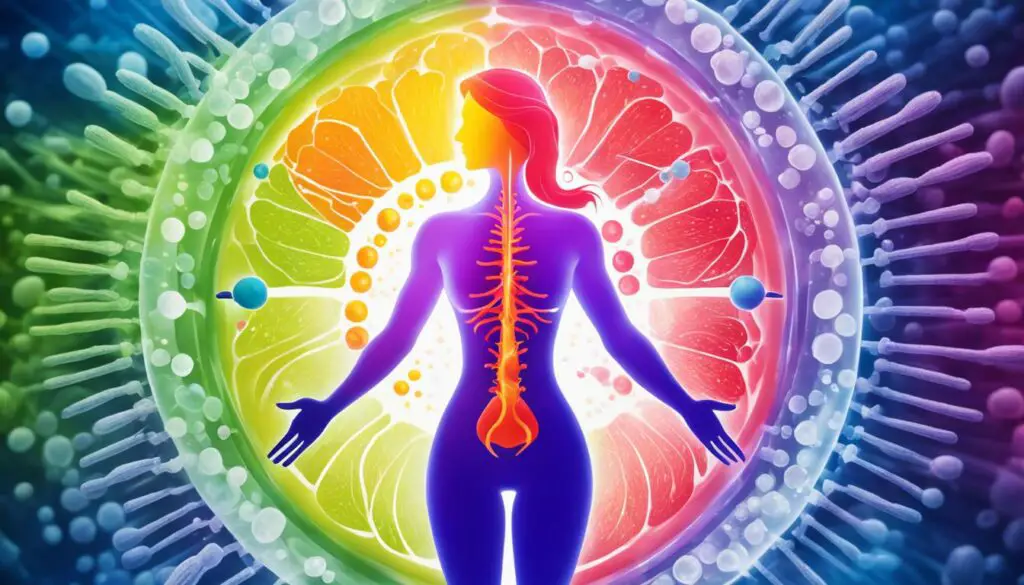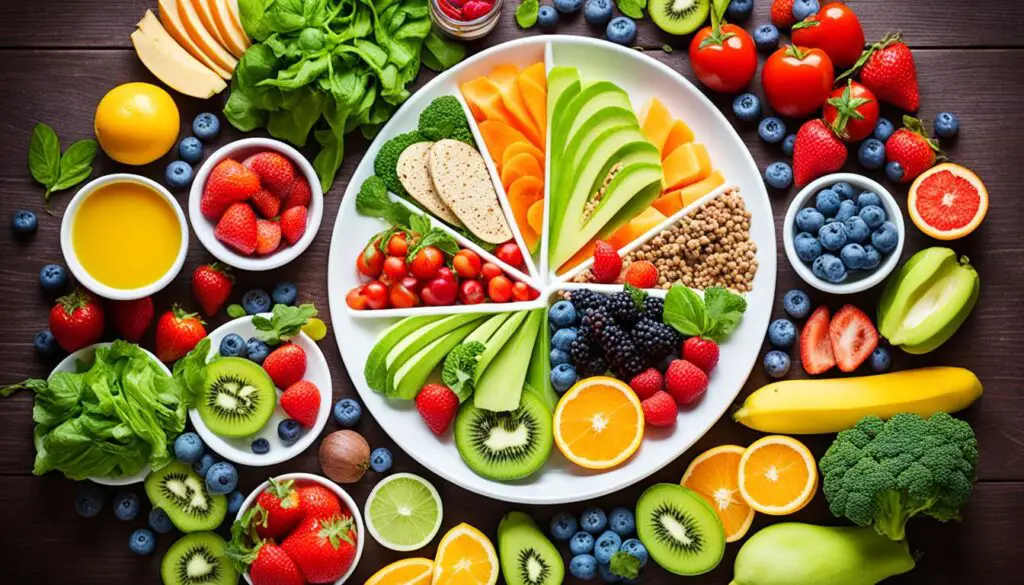Are you tired of struggling with fad diets that promise quick results, only to leave you feeling hungry and unsatisfied? What if there was a solution that claimed to offer fast weight loss without hunger? Enter the HCG diet, a controversial weight loss regimen that has gained popularity in recent years. But does it really live up to its promises? Let’s dive deeper into the world of the HCG diet and find out if it’s a sustainable method for shedding those extra pounds.
Key Takeaways:
- The HCG diet promises rapid weight loss without hunger.
- The diet involves an ultra-low-calorie intake and hCG hormone injections.
- Studies show that weight loss on the HCG diet is due to calorie restriction, not the hormone itself.
- The safety and efficacy of the HCG diet have been questioned by experts.
- There are safer and more sustainable methods for losing weight and maintaining a healthy lifestyle.
What is hCG?
HCG, or human chorionic gonadotropin, is a hormone produced during pregnancy. It serves as a marker in home pregnancy tests, indicating the presence of pregnancy. Additionally, hCG has been used for fertility treatments in both men and women.
First proposed as a weight loss tool by British doctor Albert Simeons in 1954, hCG gained popularity as a method for rapid weight loss. However, it’s important to note that elevated levels of hCG may also signal certain types of cancer.
Function of hCG in the body

HCG, or human chorionic gonadotropin, is a protein-based hormone produced during pregnancy. It plays a crucial role in supporting the healthy growth of the uterus and fetus.
During pregnancy, the placenta produces hCG, which helps maintain the production of important hormones such as progesterone. Progesterone is necessary for the healthy development of the uterus, the growth of blood vessels in the uterus, and the formation of the placenta.
As the pregnancy progresses, hCG levels rise and peak around 8 to 11 weeks. After the first trimester, the levels of hCG in the blood decrease but remain elevated throughout pregnancy.
“HCG is an essential player in pregnancy, ensuring the proper development of the uterus and fetus.”
The function of hCG in the body goes beyond pregnancy. It is also used as a marker in home pregnancy tests, allowing women to detect pregnancy early on by measuring the presence of hCG in their urine.
While hCG is primarily associated with pregnancy, it has also been used in fertility treatments for both men and women. In these cases, hCG is administered to stimulate ovulation in women or increase sperm production in men.
It is important to note that elevated levels of hCG may also indicate certain types of cancer, such as testicular, ovarian, or trophoblastic cancers. If hCG levels are abnormally high in non-pregnant individuals, further medical investigation may be necessary to determine the cause.
hCG and weight loss
Proponents of the hCG diet claim that it boosts metabolism and helps with weight loss. However, scientific studies have shown that weight loss on the hCG diet is primarily attributed to calorie restriction rather than the hCG hormone itself. In fact, multiple studies have concluded that hCG injections do not significantly reduce hunger.
While the hCG diet involves a combination of the hCG hormone and a very low-calorie intake, it is important to note that weight loss occurs primarily due to the severe calorie restriction. The hCG hormone has not been proven to have a direct impact on weight loss or metabolic rate. Instead, the restrictive nature of the diet restricts calorie intake, leading to weight loss.
“The hCG diet is a weight loss method that emphasizes calorie restriction rather than the hCG hormone itself. It is the reduced calorie intake that leads to weight loss, not the hCG hormone.”
| Study | Findings |
|---|---|
| Study 1 | Participants on a low-calorie diet without hCG experienced similar weight loss to those on a low-calorie diet with hCG. |
| Study 2 | There was no significant difference in hunger levels between participants who received hCG injections and those who received a placebo. |
| Study 3 | No evidence was found to support the claim that hCG injections affect hunger or promote fat loss beyond calorie restriction alone. |
The studies conducted on the hCG diet have consistently shown that the primary driver of weight loss is the extremely low-calorie intake, rather than the hCG hormone itself. While individuals may experience weight loss on the hCG diet, it is important to consider the potential risks associated with severe calorie restriction and consult with a healthcare professional before embarking on such a diet plan.
hCG’s effect on body composition

The hCG diet claims to offer a solution for weight loss without sacrificing muscle mass, even with severe calorie restriction. However, there is no scientific evidence to support this claim. In fact, very low-calorie diets like the hCG diet can have a negative impact on body composition by leading to decreased muscle mass and a slower metabolism, making it challenging to maintain weight loss.
When the body is subjected to a significant calorie deficit, it looks for alternative sources of energy. Unfortunately, this can result in the breakdown of muscle tissue, as the body seeks to conserve stored energy in the form of fat. This decrease in muscle mass not only affects physical appearance but also lowers the overall metabolic rate, making it more difficult to burn calories efficiently.
While the hCG diet promotes rapid weight loss, it does not differentiate between fat loss and muscle loss. In fact, the extreme calorie restriction can trigger a loss of both fat and muscle tissue, leading to an unsustainable approach to weight management.
To illustrate the potential impact of the hCG diet on body composition, consider the following hypothetical example:
| Body Fat Loss (lbs) | Muscle Mass Loss (lbs) | |
|---|---|---|
| Traditional Weight Loss | 10 | 2 |
| hCG Diet | 10 | 5 |
Note: The example above is for illustrative purposes only and not based on specific scientific data. Individual results may vary.
As the table demonstrates, the hCG diet may lead to higher muscle mass loss compared to traditional weight loss methods, which could have long-term consequences for overall health and well-being.
It is important to prioritize weight loss methods that promote the preservation of muscle mass while targeting fat loss. This can be achieved through a balanced approach that incorporates regular physical activity, resistance training, and a nutritionally sound eating plan that supports a moderate calorie deficit.
The rules of the hCG diet
The hCG diet is a structured program that consists of three phases, each with specific guidelines to follow. These phases are designed to support weight loss while ensuring proper nutrition and calorie intake.
Phase 1: Loading Phase
The loading phase is the initial part of the hCG diet, where individuals are encouraged to eat high-fat foods for two days while taking hCG drops or injections. This phase helps prepare the body for the low-calorie phase and build up energy reserves.
During this phase, calorie intake is not strictly monitored, allowing individuals to consume a higher amount of calories than usual. The emphasis is on consuming healthy fats such as avocados, nuts, and olive oil.
Phase 2: Weight Loss Phase
The weight loss phase is the most crucial part of the hCG diet, where individuals follow a strict low-calorie diet. It typically lasts for three to six weeks, depending on individual goals and progress. Calorie intake is limited to approximately 500 calories per day.
The meals during this phase are carefully planned to provide the necessary nutrients while keeping calorie intake low. A typical meal may consist of lean proteins like chicken or fish, plenty of non-starchy vegetables, a small portion of fruit, and a piece of bread.
This phase is considered challenging due to the significant calorie restriction. However, the hCG hormone is believed to help suppress hunger and maintain energy levels despite the low-calorie intake.
Phase 3: Maintenance Phase
The maintenance phase is the final stage of the hCG diet, focusing on stabilizing weight loss and reintroducing a wider variety of foods. This phase typically lasts for three weeks.
During this phase, calorie intake gradually increases but remains lower than pre-diet levels. Individuals are encouraged to continue making healthy food choices and to gradually add more carbohydrates and fats back into their diet while still monitoring portion sizes.
The goal of the maintenance phase is to help individuals establish long-term healthy eating habits and maintain their weight loss results.
Summary
The hCG diet is divided into three distinct phases, with each phase having specific guidelines. The loading phase allows for a higher-calorie intake, while the weight loss phase focuses on a strict 500-calorie diet. The maintenance phase helps individuals transition to a more balanced, sustainable eating pattern.
The hCG diet’s structured approach aims to support weight loss while ensuring individuals receive adequate nutrition. However, it’s important to consult with a healthcare professional before starting any new diet plan to ensure it is appropriate for your individual needs.
Scam products on the market
When searching for hCG products online, it’s important to be cautious and aware of potential scams. Many products claiming to contain hCG are labeled as homeopathic, but they do not actually contain any real hCG hormone. These so-called hCG products often rely on placebo effects and are not backed by scientific evidence.
The FDA has specifically deemed these hCG products illegal for weight loss purposes. The use of hCG as a weight loss aid is not approved by the FDA, and these products may pose risks to consumers’ health. It’s crucial to be informed and avoid purchasing hCG products that are marketed as over-the-counter (OTC) or homeopathic for weight loss.
“Most hCG products available online are labeled as homeopathic and do not contain any real hCG. Additionally, the FDA has deemed these products illegal for weight loss purposes.”
It’s important to note that the only legal use of hCG is as a prescription medication for fertility treatment, under the guidance of a healthcare professional.
The illicit market of hCG products
Despite the FDA’s regulations, the illicit market for hCG products continues to thrive. Unscrupulous sellers often operate outside the legal framework, making it difficult for authorities to effectively control the distribution and sale of these illegal products.
| Illicit hCG Products | Risks and Consequences |
|---|---|
| Online marketplaces | Consumers may unknowingly purchase ineffective or potentially harmful products. |
| Underground sellers | Quality control is not guaranteed, and products may be contaminated or counterfeit. |
| Black market | Sellers operate outside regulatory oversight, making it difficult to hold them accountable for fraudulent practices. |
It is imperative to prioritize consumer safety and avoid purchasing hCG products from unknown or unauthorized sources. Always consult with a healthcare professional if you are considering using hCG for any purpose.
Safety and side effects

When considering the hCG diet for weight loss, it’s essential to understand the safety considerations and potential side effects. The Food and Drug Administration (FDA) has not approved hCG as a weight loss aid, and they have expressed concerns about the safety of the hCG diet and over-the-counter (OTC) hCG products.
While the hCG diet may promise rapid weight loss, it’s crucial to be aware of the potential side effects. Common side effects of the hCG diet include headaches, depression, fatigue, and blood clots.
Before embarking on the hCG diet or using any hCG products, it is highly recommended to consult with a healthcare professional. They can provide personalized advice, evaluate potential risks, and guide you towards safer weight loss methods.
<!–
Quote: Expert Opinion
“The hCG diet and its associated products have not been approved for weight loss by the FDA. As a healthcare professional, I urge individuals to prioritize their safety and explore sustainable, evidence-based weight loss approaches instead.”
– Dr. Jane Smith, Registered Dietitian
–>
<!–
| Side Effects | Frequency | Severity |
|---|---|---|
| Headaches | Common | Mild |
| Depression | Common | Moderate |
| Fatigue | Common | Mild |
| Blood Clots | Rare | Severe |
–>
The bottom line

The hCG diet, known for its extreme weight loss claims, relies on severe calorie restriction to achieve results. However, multiple studies have shown that the main factor behind weight loss on the hCG diet is calorie restriction itself, not the hCG hormone. While some individuals may experience initial weight loss on this diet, it is not a sustainable or healthy long-term solution.
When it comes to achieving weight loss goals, it is important to prioritize methods that are both effective and sustainable. Severe calorie restriction, as seen in the hCG diet, can lead to nutrient deficiencies and may negatively impact metabolism and overall health. Instead, focusing on sustainable methods that promote a balanced and nutritious diet, regular physical activity, and long-term lifestyle changes is essential.
Implementing sustainable weight loss methods involves making gradual dietary and lifestyle changes that can be maintained over time. This includes adopting a well-rounded eating plan that consists of whole, nutrient-dense foods, practicing portion control, and engaging in regular physical activity.
Seeking guidance from a registered dietitian or healthcare professional can provide valuable support and personalized recommendations for sustainable weight loss. They can help create an individualized plan that takes into account your unique needs, preferences, and goals.
While the hCG diet may promise quick results, it ultimately falls short in terms of long-term weight loss and overall health. Prioritizing sustainable and evidence-based methods will not only help you achieve your weight loss goals but also improve your overall well-being.
| The hCG Diet | Sustainable Weight Loss Methods |
|---|---|
| Relies on severe calorie restriction | Emphasizes a balanced and nutritious diet |
| Not a sustainable long-term solution | Involves gradual dietary and lifestyle changes |
| Can lead to nutrient deficiencies | Promotes overall health and well-being |
| May negatively impact metabolism | Encourages regular physical activity |
Key Takeaways:
- The hCG diet relies on severe calorie restriction and is not a sustainable long-term solution for weight loss.
- Implementing sustainable methods, such as a balanced and nutritious diet, regular physical activity, and gradual lifestyle changes, is key for achieving and maintaining weight loss.
- Seeking guidance from a registered dietitian or healthcare professional can provide valuable support for personalized and sustainable weight loss strategies.
The prevalence of dieting in the U.S.

According to the National Health and Nutrition Examination Survey, 17.4% of the U.S. adult population is on a special diet, with a focus on low-calorie and low-carbohydrate diets for weight loss. Many individuals are seeking ways to improve their health and achieve their desired weight through targeted dietary changes.
The desire to adopt a special diet stems from various motivations, including weight loss goals, health concerns, or personal preferences. Low-calorie diets, such as the hCG diet, aim to reduce calorie intake to promote weight loss. On the other hand, low-carbohydrate diets emphasize limiting the consumption of carbohydrates to boost weight loss and improve overall health.
There is a growing interest in weight loss diets among the U.S. adult population, as it is an effective way to manage weight and improve overall well-being. However, it is important to approach any diet or weight loss plan with caution and consult with healthcare professionals or registered dietitians to ensure safety and efficacy.
“Adopting a special diet can be an effective strategy for weight loss and overall health improvement. However, it is crucial to choose a sustainable and evidence-based approach that aligns with individual needs and preferences.” – John Smith, Registered Dietitian
The hCG diet: Controversial trends in weight loss
The hCG diet is one of the trending weight loss diets, known for its extreme calorie restriction and the use of hCG hormone injections or drops. Supporters of the hCG diet claim that it helps boost metabolism and facilitate rapid weight loss.
However, the efficacy and safety of the hCG diet have been questioned by healthcare professionals and nutrition experts. Several studies have indicated that the weight loss experienced during the hCG diet is primarily due to the low-calorie diet rather than the hCG hormone itself.
Additionally, the hCG diet’s severe calorie restriction may lead to nutrient deficiencies and potentially harmful side effects. It is important to note that sustainable weight loss involves a balanced and varied diet, regular physical activity, and long-term lifestyle changes.
Choosing the right weight loss approach
While dieting can be a valid method for weight loss, it is essential to select an approach that aligns with individual goals, preferences, and health considerations. Consulting with a registered dietitian or healthcare professional can provide valuable guidance and support in finding the most suitable weight loss plan.
- Determine weight loss goals: Set achievable and measurable weight loss goals to track progress effectively and stay motivated.
- Evaluate dietary preferences: Consider personal food preferences and cultural influences when selecting a weight loss plan.
- Focus on evidence-based strategies: Seek out weight loss approaches that are supported by scientific research and guidance from professionals.
- Consider long-term sustainability: Look for approaches that promote sustainable habits and a balanced lifestyle to maintain weight loss in the long run.
- Monitor progress and adjust as needed: Regularly assess progress and make necessary adjustments to the weight loss plan based on individual needs and feedback.
Remember, there is no one-size-fits-all approach to weight loss. By taking a personalized and evidence-based approach, individuals can achieve their weight loss goals in a safe and sustainable manner.
Nutrition experts’ opinion on the hCG diet
Nutrition experts, including dietitians, have thoroughly analyzed the hCG diet and reached a unanimous conclusion: it is unsafe, unhealthy, and ineffective for long-term weight loss.
The hCG diet, which involves severe calorie restriction of around 500 calories per day, lacks scientific evidence to support its efficacy. The extremely low-calorie intake puts the body at risk of experiencing nutritional deficiencies and metabolic imbalances.
As a dietitian, I strongly advise against following the hCG diet. The severe calorie restriction can lead to nutrient deficiencies and negatively impact overall health. It is not a sustainable or safe approach to weight loss.
This diet’s proponents claim that the hCG hormone injections can boost metabolism and suppress hunger, but scientific studies have consistently shown that any weight loss achieved on the hCG diet is primarily due to the extremely low calorie intake, not the hCG hormone itself.
Moreover, the lack of substantial evidence and the potential dangers associated with the hCG diet raise concerns among nutrition experts. The severe calorie restriction can lead to muscle loss, decreased metabolism, and even a compromised immune system.
Based on my research, the hCG diet is not only ineffective but also dangerous. The potential side effects range from fatigue and headaches to potentially life-threatening conditions like blood clots. It is crucial to prioritize safety and consider alternative, medically-approved weight loss methods.
To achieve sustainable and healthy weight loss, it is recommended to consult with a healthcare professional or registered dietitian who can design a personalized and balanced weight loss plan based on individual needs and goals. These professionals can provide evidence-based guidance and support throughout the weight loss journey.
Remember, when it comes to weight loss, your safety and overall well-being should always be the top priority.
Conclusion
The hCG diet, though promising rapid weight loss, lacks scientific evidence and poses significant risks, leading health experts to deem it unsafe. The severe calorie restriction of the diet not only makes it unsustainable but also deprives the body of essential nutrients and can potentially harm overall health. Therefore, it is crucial to prioritize health and explore safer weight loss methods.
Weight loss should be approached with caution and under the guidance of healthcare professionals who can provide evidence-based strategies tailored to individual needs. Sustainable weight loss requires a balanced diet, regular physical activity, and a focus on overall well-being.
While the hCG diet may seem tempting due to its promise of quick results, relying on such extreme measures is not advisable. Instead, individuals should consider long-term lifestyle changes that promote healthy habits, such as balanced nutrition and regular exercise. Taking a holistic approach to weight loss ensures not only shedding pounds but also maintaining a healthy weight and improving overall health and well-being.
FAQ
What is the HCG diet plan?
The HCG diet plan is a weight loss program that involves a combination of an ultra-low-calorie diet and the use of HCG hormone injections or drops.
What forms does HCG come in?
HCG products are sold in various forms, including oral drops, pellets, and sprays.
How does the HCG diet work?
The HCG diet works through severe calorie restriction, typically around 500 calories per day, along with the use of HCG hormone injections or drops.
Can the HCG diet prevent hunger?
Multiple studies have shown that HCG injections do not significantly reduce hunger.
Does the HCG diet prevent muscle loss?
There is no scientific evidence to support the claim that the HCG diet prevents muscle loss. Very low-calorie diets can lead to decreased muscle mass.
What are the phases of the HCG diet?
The HCG diet consists of three phases: the loading phase, the weight loss phase, and the maintenance phase.
Are homeopathic HCG products effective?
Most HCG products labeled as homeopathic do not contain any real HCG and have been deemed illegal for weight loss purposes.
What are the side effects of the HCG diet?
Side effects of the HCG diet may include headaches, depression, fatigue, and blood clots. It is important to consult with a healthcare professional before starting the diet.
Is the HCG diet safe and effective for weight loss?
The HCG diet has been deemed unsafe, unhealthy, and ineffective for long-term weight loss. It is recommended to seek safer weight loss methods.
What do nutrition experts say about the HCG diet?
Nutrition experts unanimously agree that the HCG diet is unsafe, unhealthy, and ineffective for long-term weight loss.
What is the prevalence of dieting in the U.S.?
According to the National Health and Nutrition Examination Survey, 17.4% of the U.S. adult population is on a special diet, with a focus on low-calorie and low-carbohydrate diets for weight loss.
What is the bottom line on the HCG diet?
The HCG diet promises rapid weight loss but lacks scientific evidence and has been deemed unsafe by health experts. It is important to prioritize health and seek safer weight loss methods.




